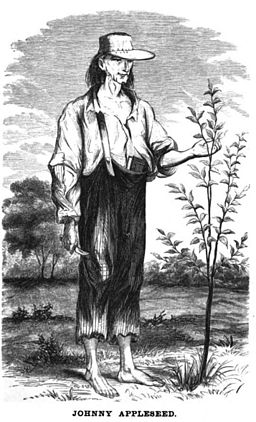 Is it possible to seed resilient communities? Most people assume that the only way to do this is to write a book or share information.
Is it possible to seed resilient communities? Most people assume that the only way to do this is to write a book or share information.
Here’s another more action oriented way to do it. A method modeled on the career of Johnny Appleseed.
Johnny Appleseed is a well known American legend. While many people imagine him traveling the countryside as a beggar — planting apple trees in every nook and cranny — that isn’t actually the case.
In reality he was an early entrepreneur. He started businesses.
What?
He traveled the newly settled mid-western US planting apple orchards and nurseries that he ran as decentralized co-operative businesses. Here’s how he did it:
- When he arrived in a newly settled area, he acquired some land. It was usually cheap land.
- He then planted an orchard and established a relationship with a neighboring farmer.
- He then left the business in the hands of the neighbor, who in turn leased the individual trees to the community to generate income.
- Interesting twist: Since the apples were sour, they were used them to make hard cider.
How successful was he? By the end of his life, he had established 1,200 acres of orchards and nurseries across multiple states (he actually planted much more than this, but his accounting was spotty), run in much the same way as community supported agriculture is run today.
What makes Johnny interesting to us is that he seeded these early, struggling communities with local production. Production that made them both more valuable and better places to live.
Is it possible to be a modern, technically astute Johnny Appleseed seeding micro co-operatives that run permaculture gardens/orchards, local composting businesses, solar heating systems… across the countryside?
I think so. He’s an interesting role model.
Your thinking about new ways to build resilient businesses analyst,
John Robb


